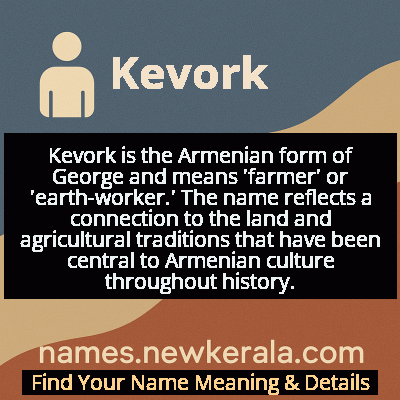Kevork Name Meaning & Details
Origin, Popularity, Numerology Analysis & Name Meaning of Kevork
Discover the origin, meaning, and cultural significance of the name KEVORK. Delve into its historical roots and explore the lasting impact it has had on communities and traditions.
Name
Kevork
Gender
Male
Origin
Armenian
Lucky Number
1
Meaning of the Name - Kevork
Kevork is the Armenian form of George and means 'farmer' or 'earth-worker.' The name reflects a connection to the land and agricultural traditions that have been central to Armenian culture throughout history.
Kevork - Complete Numerology Analysis
Your Numerology Number
Based on Pythagorean Numerology System
Ruling Planet
Sun
Positive Nature
Leaders, ambitious, highly driven, self-reliant, innovative.
Negative Traits
Overly aggressive, domineering, impatient, selfish.
Lucky Colours
Red, orange, gold.
Lucky Days
Sunday.
Lucky Stones
Ruby, garnet.
Harmony Numbers
2, 3, 9.
Best Suited Professions
Entrepreneurs, managers, engineers.
What People Like About You
Courage, determination, leadership.
Famous People Named Kevork
Kevork I of Armenia
Religious Leader
Catholicos of the Armenian Apostolic Church who played a crucial role in preserving Armenian Christian identity
Kevork Malikyan
Actor
Internationally recognized Armenian-British actor known for roles in 'Indiana Jones and the Last Crusade' and 'The Promise'
Kevork Marashlian
Historian
Prominent Armenian historian and scholar specializing in Ottoman and Armenian studies
Kevork Ajemian
Journalist
Influential Armenian journalist and editor who contributed significantly to Armenian diaspora literature
Name Variations & International Equivalents
Click on blue names to explore their detailed meanings. Gray names with will be available soon.
Cultural & Historical Significance
The name also symbolizes resilience and survival, as it remained popular through various historical challenges faced by the Armenian people, including the Armenian Genocide and diaspora experiences. Many Armenian families have passed down this name for centuries, making it a marker of cultural continuity and identity preservation. In Armenian communities worldwide, the name Kevork serves as a tangible connection to ancestral roots and shared history, embodying both religious faith and cultural pride that have sustained Armenian identity through centuries of change and challenge.
Extended Personality Analysis
Individuals named Kevork are often perceived as grounded, practical, and hardworking, reflecting the name's agricultural meaning. They typically exhibit strong family values and cultural pride, with a deep connection to their Armenian heritage. Kevorks are frequently described as reliable and steadfast, possessing the endurance and patience associated with farming traditions. Many display leadership qualities combined with humility, often taking on community roles while maintaining a strong sense of personal integrity.
Their personality often blends traditional values with adaptability, allowing them to navigate both conservative and modern environments effectively. The name carries expectations of responsibility and moral strength, with many Kevorks developing a quiet confidence and determination that serves them well in both personal and professional endeavors. They are often seen as pillars of their communities - dependable, principled, and committed to preserving what matters most, whether that be family traditions, cultural heritage, or professional standards. This combination of earthy practicality and spiritual depth makes Kevorks particularly respected figures in Armenian social circles.
Modern Usage & Popularity
In contemporary times, Kevork remains a popular traditional name among Armenians worldwide, though its usage has evolved with changing social trends. While still common in Armenia and among diaspora communities, it faces some competition from more modern and international names, particularly in urban areas and among younger generations. The name maintains strong cultural resonance, particularly among families seeking to preserve Armenian heritage and those with strong connections to the Armenian Apostolic Church. In recent decades, there's been a slight decline in urban centers of Armenia in favor of names with more global appeal, but it remains a staple in traditional Armenian families and continues to be widely recognized and respected. Among diaspora communities, Kevork serves as an important cultural marker, helping maintain Armenian identity across generations while adapting to different host cultures.
Symbolic & Spiritual Meanings
Kevork symbolizes deep connection to the earth, tradition, and cultural endurance. The farmer symbolism extends beyond literal agriculture to represent cultivation of values, family, and community - the idea of planting seeds that will grow and sustain future generations. It embodies the concept of nurturing growth in all aspects of life, from personal relationships to cultural preservation, reflecting the patience and care required for meaningful development. The name carries powerful connotations of resilience and survival, mirroring the Armenian people's remarkable ability to maintain their identity through centuries of historical challenges and displacement. It represents the beautiful intersection of spiritual devotion (through its connection to Saint George) and practical earthly concerns, creating a balanced symbolism that values both faith and hard work, prayer and labor, tradition and progress.

